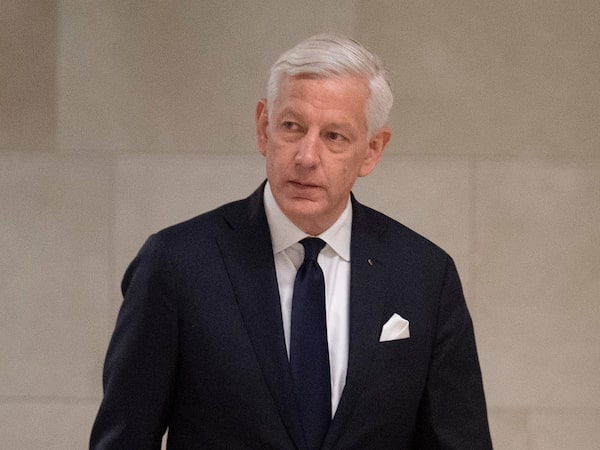
Canada's Ambassador to China Dominic Barton makes his way to a committee room to appear before the House of Commons committee on Canada-China relations in Ottawa, on Feb. 5, 2020.Adrian Wyld/The Canadian Press
Back in 2015, Dominic Barton, then-global managing director of McKinsey & Co., pitched clients in China and beyond on his firm’s services as the Communist regime in Beijing sought to extend its geopolitical influence by funding and building critical infrastructure projects in developing countries in Asia and Africa.
In Mr. Barton’s telling, the Chinese plan, known as the Belt and Road Initiative, or BRI, was a win-win proposition that would help low-income countries move up the development ladder. Where many saw a stealth exercise by China to “entrap” poor states, making them financially beholden to Beijing, Mr. Barton saw a giant leap forward for mankind.
“The world is waiting for the ‘One Belt, One Road’ grand blueprint to move from dream to reality,” Mr. Barton and his colleagues said then, in a statement posted on McKinsey’s Chinese website. “We are willing to work with governments, enterprises and think tanks to conduct more detailed research on [the BRI] and contribute a little to the expansion and prosperity of human society.”
The blurb encapsulated the kind of positive spin McKinsey habitually put on its work for clients, whose aims were anything but altruistic, during Mr. Barton’s nine-year tenure at the helm of McKinsey between 2009 and 2018. McKinsey earned millions in fees from authoritarian governments and state-owned enterprises in China, Russia and Saudi Arabia. Yet, it continually portrayed itself as a force for good in the world.
As authors Walt Bogdanich and Michael Forsythe describe the situation in their new book, When McKinsey Comes to Town, the firm promoted itself in public as a values-driven organization. But its behaviour repeatedly belied that image.
Mr. Barton, who served as Canada’s ambassador to China until late 2021, does not come off well in the book. Indeed, most of the scandals that have haunted McKinsey in recent years originated during his tenure – from its work advising Purdue Pharma on how to “turbocharge” OxyContin sales (for which it paid US$641-million last year to settle legal claims with several U.S. states) to the laying of criminal charges last month by South African authorities over McKinsey’s work for the country’s state-owned freight-rail operator.
What is most disturbing about the Barton era at McKinsey, however, is the extent to which the firm, with offices in 65 countries and more than 40,000 employees, became an agent of undemocratic governments and state-owned enterprises at a pivotal moment in history. Mr. Barton appears to have taken a more benign view than others of the stakes involved in helping Russia and China achieve their geopolitical goals.
“In Russia, the VTB Bank, which has operated under U.S. and [European Union] sanctions since 2014, ranked among McKinsey’s top clients by revenue in recent years, as did Gazprom, the state-controlled energy giant,” Mr. Bogdanich and Mr. Forsythe write. “The head of Russia’s sovereign wealth fund, Kirill Dmitriev, is a McKinsey alum.”
McKinsey’s work on behalf of authoritarian governments, and companies that operate under them, often appeared to run contrary to the national security interests of Western democracies. Its advice may also have enabled dictatorships to suppress dissent or violate the human rights of their citizens.
The firm appears to have turned a blind eye to blatant conflicts of interest. McKinsey not only counted nine of the top 15 Chinese contractors on the Belt and Road Initiative as clients, but it was also hired by foreign governments to advise them on how and whether to participate in the BRI. It worked for almost every major U.S. pharmaceutical giant, while at the same time advising the U.S. Food and Drug Administration on regulatory matters affecting its private-sector clients.
In June, Prime Minister Justin Trudeau’s government named Mr. Barton to its Indo-Pacific Advisory Committee. That body is charged with making recommendations to Foreign Affairs Minister Mélanie Joly as she crafts Ottawa’s long-awaited Indo-Pacific strategy amid an emerging cold war between the West and China.
It remains to be seen how much influence Mr. Barton, who once described himself as a “bull on China,” will end up having on the strategy. After all, the benevolent worldview embodied by McKinsey during Mr. Barton’s years at the helm, the one that saw opening Western markets to China and Russia as a stepping-stone to a freer and more prosperous world, has come back to bite the West.
As Deputy Prime Minister Chrystia Freeland declared in a speech last week in Washington: “The economic ties we thought would constrain Russian bellicosity are instead being used to try to blunt our response to the Kremlin’s war crimes... China is likewise adept and intentional in using its economic ties with us as leverage to achieve its geopolitical objectives.”
McKinsey, meanwhile, seems eager to put the Barton years behind it.
“We have made mistakes, we acknowledged them and made changes,” the firm said in a statement posted this month on its website. “We now follow a global client selection policy more rigorous than any other in our industry.”
 Konrad Yakabuski
Konrad Yakabuski